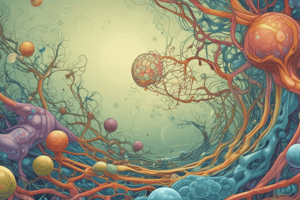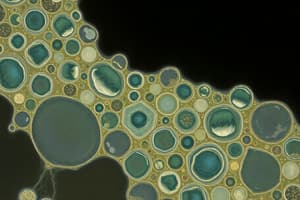Podcast
Questions and Answers
Which statement accurately summarizes the Cell Theory?
Which statement accurately summarizes the Cell Theory?
- All living organisms are composed of tissues.
- All cells are identical in structure and function.
- Cells can arise from non-living matter.
- The cell is the basic unit of life and all cells arise from pre-existing cells. (correct)
What distinguishes eukaryotic cells from prokaryotic cells?
What distinguishes eukaryotic cells from prokaryotic cells?
- Eukaryotic cells reproduce by binary fission.
- Eukaryotic cells do not contain a nucleus.
- Eukaryotic cells are generally smaller than prokaryotic cells.
- Eukaryotic cells contain membrane-bound organelles. (correct)
Which organelle is primarily responsible for ATP production in the cell?
Which organelle is primarily responsible for ATP production in the cell?
- Ribosomes
- Golgi Apparatus
- Mitochondria (correct)
- Endoplasmic Reticulum
What is the main function of the Golgi Apparatus?
What is the main function of the Golgi Apparatus?
Which transport mechanism requires energy to move substances across a cell membrane?
Which transport mechanism requires energy to move substances across a cell membrane?
Flashcards are hidden until you start studying
Study Notes
Cell Biology
-
Definition: Study of cells, their physiological properties, structures, organelles, interactions, and functions.
-
Cell Theory:
- All living organisms are composed of cells.
- The cell is the basic unit of life.
- All cells arise from pre-existing cells.
-
Types of Cells:
-
Prokaryotic Cells:
- Lack a nucleus and membrane-bound organelles.
- Example: Bacteria and Archaea.
- Generally smaller and simpler than eukaryotic cells.
-
Eukaryotic Cells:
- Have a nucleus and membrane-bound organelles.
- Example: Animal cells, plant cells, fungi, and protists.
- Larger and more complex.
-
-
Cell Structure:
-
Plasma Membrane:
- Semi-permeable barrier that controls the movement of substances in and out of the cell.
-
Nucleus:
- Contains genetic material (DNA).
- Controls cell activities and reproduction.
-
Cytoplasm:
- Gel-like substance where cellular processes occur.
- Contains organelles.
-
-
Organelles:
-
Mitochondria:
- Powerhouse of the cell; site of ATP (energy) production.
-
Ribosomes:
- Sites of protein synthesis; can be free-floating or attached to the endoplasmic reticulum.
-
Endoplasmic Reticulum (ER):
- Rough ER: Studded with ribosomes; involved in protein synthesis and processing.
- Smooth ER: Lacks ribosomes; involved in lipid synthesis and detoxification.
-
Golgi Apparatus:
- Modifies, sorts, and packages proteins and lipids for secretion or delivery to other organelles.
-
Lysosomes:
- Contain digestive enzymes to break down waste materials and cellular debris.
-
Chloroplasts (in plant cells):
- Site of photosynthesis; contains chlorophyll.
-
-
Cell Division:
-
Mitosis:
- Process of cell division resulting in two identical daughter cells.
-
Meiosis:
- Specialized division that produces gametes (sperm and egg cells); results in four genetically diverse cells.
-
-
Cell Communication:
- Cells communicate through signaling molecules and receptors.
- Types of signaling: autocrine, paracrine, endocrine, and juxtacrine.
-
Cell Transport:
- Passive Transport: Movement of substances across the membrane without energy input (e.g., diffusion, osmosis).
- Active Transport: Movement of substances against their concentration gradient, requiring energy (e.g., sodium-potassium pump).
-
Cell Function:
- Cells perform essential functions necessary for life, including metabolism, energy production, synthesis of biomolecules, and response to stimuli.
-
Cell Specialization:
- Cells can differentiate into specialized types to perform specific functions (e.g., muscle cells, nerve cells).
-
Cell Cycle:
- Phases: Interphase (G1, S, G2) and M Phase (mitosis and cytokinesis).
- Regulation by checkpoints to ensure proper division and function.
Cell Biology Overview
- Study of cells encompasses physiological properties, structures, organelles, interactions, and functions.
Cell Theory
- Living organisms are made of cells; cells are the fundamental unit of life.
- Cells originate only from pre-existing cells.
Types of Cells
-
Prokaryotic Cells:
- Absence of nucleus and membrane-bound organelles.
- Examples include Bacteria and Archaea; these cells are generally smaller and simpler.
-
Eukaryotic Cells:
- Presence of a nucleus and membrane-bound organelles.
- Include Animal, Plant, Fungi, and Protist cells; these cells are larger and more complex.
Cell Structure
-
Plasma Membrane:
- Semi-permeable, regulates substance entry and exit.
-
Nucleus:
- Houses genetic material (DNA) and oversees cell activities and reproduction.
-
Cytoplasm:
- Gel-like medium for cellular processes and organelles.
Organelles
-
Mitochondria:
- Known as the powerhouse of the cell; ATP production site.
-
Ribosomes:
- Sites of protein synthesis; can be free in the cytoplasm or bound to the endoplasmic reticulum.
-
Endoplasmic Reticulum (ER):
- Rough ER: Contains ribosomes; key in protein synthesis and processing.
- Smooth ER: Lacks ribosomes; involved in lipid synthesis and detoxifying substances.
-
Golgi Apparatus:
- Modifies, sorts, and packages proteins and lipids for secretion or transport to other organelles.
-
Lysosomes:
- Contain enzymes for digestion of waste and cellular debris.
-
Chloroplasts (in plant cells):
- Location of photosynthesis and contain chlorophyll.
Cell Division
-
Mitosis:
- Process producing two identical daughter cells.
-
Meiosis:
- Specialized division forming gametes (sperm and egg cells); results in four genetically distinct cells.
Cell Communication
- Cells use signaling molecules and receptors for communication.
- Types of signaling include autocrine, paracrine, endocrine, and juxtacrine.
Cell Transport
-
Passive Transport:
- Substance movement across membranes without energy (e.g., diffusion, osmosis).
-
Active Transport:
- Movement against concentration gradients requiring energy (e.g., sodium-potassium pump).
Cell Function
- Cells are responsible for vital functions like metabolism, energy production, and biomolecule synthesis, along with responding to stimuli.
Cell Specialization
- Cells can differentiate into specialized types for specific functions, such as muscle or nerve cells.
Cell Cycle
- Includes phases of Interphase (G1, S, G2) and M Phase (mitosis and cytokinesis).
- Cell division regulation occurs through checkpoints to ensure orderly function and replication.
Studying That Suits You
Use AI to generate personalized quizzes and flashcards to suit your learning preferences.




